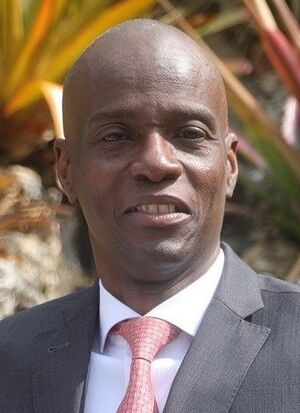Jovenel Moïse
(politician) | |
|---|---|
 | |
| Born | 26 June 1968 Haiti |
| Died | 7 July 2021 (Age 53) Haiti |
| Nationality | Haitian |
| Victim of | assassination |
| Subpage | •Jovenel Moïse/Assassination |
Jovenel Moïse was the President of Haiti until his assassination in July 2021. The killing came at a time of rapidly increasing instability and insecurity in the country.[1]
Of possible relevance, per June 20201, Haiti the only nation in the Western hemisphere that has dragged its feet and hasn't injected a single resident with experimental Covid vaccines. The government initially declined AstraZeneca shots, citing side-effects and widespread fears of hidden agendas in the population[2], in a country used to being on the receiving end of medical experiments. “Haiti did not reject the offer of vaccines from Covax,” Ministry of Health general director Laure Adrien said. “All we asked was that they change the vaccine they were providing us,”[2] referring to the dumping of expired doses[3].
Early life and education
Jovenel Moïse was born in Trou du Nord, Nord-Est, Haiti, on 26 June 1968. In July 1974, his family moved to Port-au-Prince, where he continued his primary studies at École Nationale Don Durélin, and followed up with his secondary studies first at Lycée Toussaint Louverture, and then at Centre Culturel du Collège Canado-Haïtien.[4] In 1996, he married his classmate Martine Marie Étienne Joseph.[4] That same year, they left the capital and established themselves in Port-de-Paix to develop rural areas.[4]
Business career
With little investment capital, Moïse launched his first business in Port-de-Paix, JOMAR Auto Parts. That same year, he began development of an agricultural project of organic banana production from a plantation, obivosuly in collaboration with one or more Western NGOs.
In 2001, Moïse partnered with Culligan to start a drinking water plant for distribution to the Nord-Ouest and Nord-Est departments. In 2012, he founded AGRITRANS SA, introduced the agricultural project NOURRIBIO to Trou du Nord, and helped create Haiti's first agricultural free trade zone, a 1000-hectare (2,500-acre) banana plantation in Nord-Est.[5] This project was supposed to export bananas to Germany, for the first time since 1954; however, only two containers were ever sent. This nonetheless led him to be nicknamed Nèg Bannann (Banana Man). The government granted tax-free access to the land and a $6 million loan to a new company, Agritrans, owned by Moïse, the president of the local chamber of commerce. Anonymous investors contributed at least another $10 million.[6]
Politics
In 2015, President Michel Martelly designated Moïse as the presidential candidate of the political party Martelly founded, the center-right Haitian Tèt Kale Party (PHTK).[7] In his campaign, Moïse promoted bio-ecological agriculture as an economic engine for Haiti, whose population is over 50% rural.[8] He also talke warmly of policies pursued by Martelly: universal education and health care, energy reform, rule of law, the creation of sustainable jobs, environmental protection, and the development of Haiti as a destination for ecotourism and agritourism.
On 27 November 2016, election officials said Moïse had won the 2016 election in the first round based on preliminary results, with an estimated voter turnout of 21%, beating out 26 other candidates—four of whom claimed victory, before the official results were announced.[9][10] Moïse faced challenges to his mandate, from opposition leaders who believed that Moïse's mandate should end from the date of the inconclusive 2015 elections.
At the presidential level for the November 2016 elections, over a year after the previous election was annulled following allegations of fraud, Jovenel Moïse of PHTK came in first place with 55.67 percent of the vote.[11] Moïse secured the presidency without having to compete in a second-round election.
References
- ↑ https://libya360.wordpress.com/2021/07/07/de-facto-president-of-haiti-jovenel-moise-assassinated/
- ↑ a b https://www.businesslive.co.za/bd/world/americas/2021-06-09-haiti-has-no-covid-19-vaccines/
- ↑ https://www.msn.com/en-us/health/medical/as-countries-race-to-vaccinate-against-covid-19-haiti-has-yet-to-give-one-dose/ar-BB1ftSbo
- ↑ a b c https://web.archive.org/web/20170207195215/http://www.ibtimes.com/who-jovenel-moise-meet-haitis-new-president-after-2016-election-248800
- ↑ https://web.archive.org/web/20161130191658/http://www.haitilibre.com/article-15872-haiti-portrait-qui-est-jovenel-moise.html
- ↑ https://web.archive.org/web/20190322135928/https://www.thenation.com/article/amid-uprising-can-haitian-president-jovenel-moise-deliver-promises/
- ↑ https://web.archive.org/web/20201224025759/https://www.bbc.com/news/world-latin-america-38503654
- ↑ https://web.archive.org/web/20210314192001/https://www.haitilibre.com/en/news-15872-haiti-portrait-who-is-jovenel-moise.html
- ↑ https://web.archive.org/web/20210608190906/https://www.france24.com/en/20161129-moise-wins-haiti-presidential-election-first-round-provisional-results-show
- ↑ https://web.archive.org/web/20161129205848/http://www.miamiherald.com/news/nation-world/world/americas/haiti/article117626878.html%7Curl-status=liv}
- ↑ https://www.bbc.com/news/world-latin-america-38140316